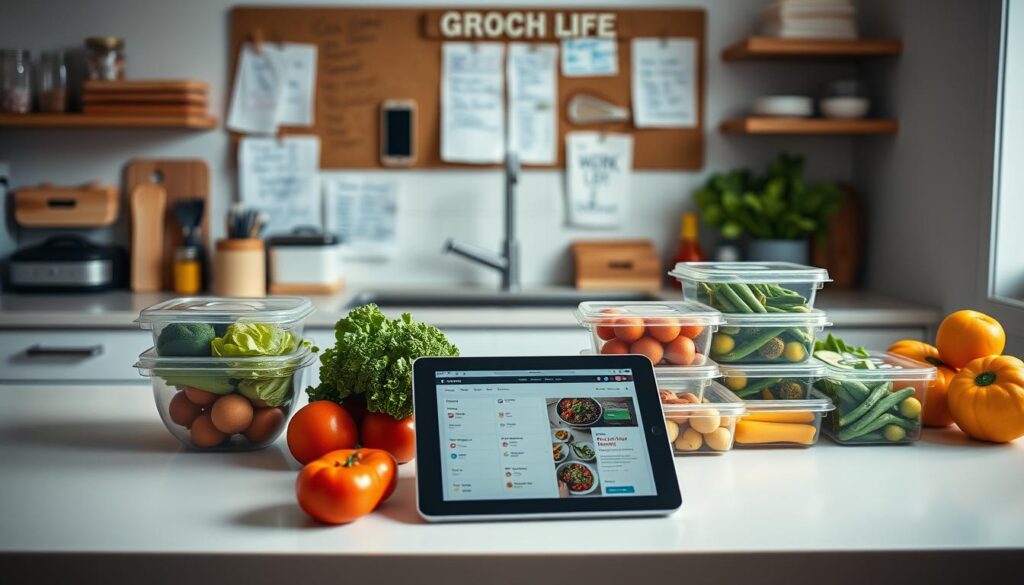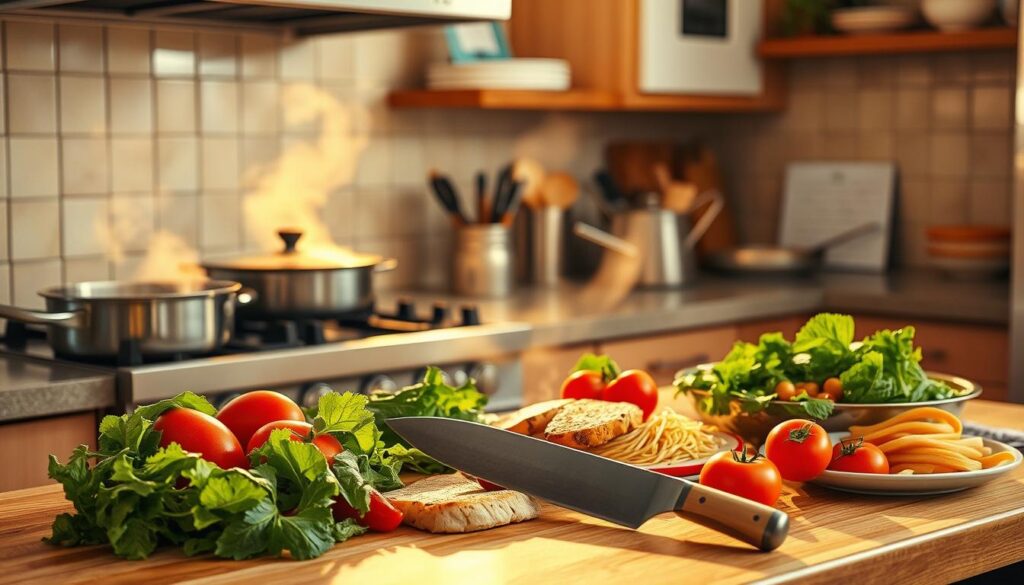Meal Planning for Busy People – Busy professionals often find it hard to balance work and life. Meal planning can change this. It saves time, reduces stress, and helps you eat healthier. Meal planning is key for those with tight schedules, helping them manage time better and eat well.
Meal planning is great for those with packed schedules. It ensures you eat nutritious food, even on busy days. It helps Meal Planning for Busy People focus on their health, making it easier to balance work and life.

Adopting a meal planning routine offers many benefits. It boosts productivity, improves health, and lowers stress. Meal planning lets you control your schedule and focus on your well-being. With a bit of planning, you can improve your life quality.
Key Takeaways Meal Planning for Busy People
- Meal planning can help Meal Planning for Busy People save time and reduce stress
- Planning your meals in advance can promote healthy eating and improve overall well-being
- Meal planning is essential for maintaining a work-life balance
- Busy professionals can benefit from meal planning by increasing productivity and improving health
- Meal planning can be a simple yet effective way to prioritize your well-being
- By incorporating meal planning into your daily routine, you can achieve a better work-life balance
Why Meal Planning is Essential for Busy Professionals
Managing time well is key for busy professionals to boost productivity and cut down stress. Meal planning is a big part of this. It helps save time, cuts down on food waste, and promotes healthier eating. It’s a simple yet powerful way to manage time better.
Meal planning also helps save money. By planning meals and making a shopping list, you avoid buying things on impulse. This can save a lot of money over time, which you can use for other important things. Plus, it leads to eating healthier, with less processed foods and more nutrients.
- Improved time management: Planning meals ahead saves time during the week for other tasks.
- Cost savings: Sticking to a budget and reducing waste saves money.
- Health benefits: It encourages healthier eating, cutting down on processed foods and boosting nutrient intake.
Adding meal planning to a busy schedule can greatly improve your life. It helps manage time, save money, and eat better. With a bit of planning and creativity, meal planning can be a game-changer for busy professionals. It helps achieve a better balance between work and life.
Getting Started with Basic Meal Planning for Busy People
Starting Meal Planning for Busy People can feel overwhelming. But, it’s key to balance work and life better. First, set goals like saving time, eating well, or cutting down on food waste. Knowing your dietary needs is also crucial. It helps make a meal plan that fits your taste and health goals.
Meal planning can be easy. Just plan meals around staple ingredients or cook in bulk. Busy folks can start by setting aside time each week for meal planning. Even 30 minutes on a Sunday can make a big difference. It helps you get started and stay on track.
- Keep it simple and flexible
- Use a planner or app to stay organized
- Buy groceries in bulk
- Prep meals ahead of time
By following these tips, busy people can save time, reduce stress, and eat healthier. Meal planning makes a big difference in daily life.
Essential Tools and Resources for Efficient Meal Planning for Busy People
Having the right tools and resources is key for efficient meal planning. With many options out there, picking the best can be tough. We’ll look at Meal Planning for Busy People tools, kitchen equipment, and grocery shopping resources to help you plan healthy meals easily.
Digital planning apps like Plan to Eat and Yummly are popular. They let you organize recipes, plan meals, and make grocery lists. These apps can really help you save time and make meal planning smoother.
Having the right kitchen equipment is also crucial. You’ll need a slow cooker, instant pot, and good knives. These tools make cooking faster and easier, and they’re great for many recipes.
For grocery shopping, a well-organized list is essential. Use a template or app to make your list and check off items as you shop. Apps like Out of Milk and Flipp help you find sales and even order groceries online.
Using these tools and resources makes meal planning and grocery shopping easier. Whether you’re busy or a parent on-the-go, the right tools help you prepare healthy meals without hassle.
- Digital planning apps, such as Plan to Eat and Yummly
- Kitchen equipment, such as slow cookers and instant pots
- Grocery shopping apps, such as Out of Milk and Flipp
By adding these tools to your meal planning routine, you’ll save time, reduce stress, and enjoy tasty, healthy meals.
Smart Shopping Strategies for Time-Pressed Individuals
For busy professionals, Meal Planning for Busy People and smart shopping are key. Planning ahead and using shopping trips wisely saves time and cuts down on food waste. Good time management is vital to focus on what’s important and make the most of your time.
Making a grocery list based on meal planning needs is a smart move. It helps avoid impulse buys and keeps you on track. Sticking to your list also means less waste and saving money.
Some smart shopping tips include:
- Plan meals around seasonal produce to save money and get fresher food
- Buy in bulk to cut down on packaging waste and save time
- Use digital tools to manage your grocery lists
By using these strategies, you can improve your time management skills. This makes shopping trips more efficient and enjoyable. It also reduces stress and makes meal planning more fun and easy.
Adopting smart shopping habits helps you control your meal planning and use your time better. With a bit of practice, anyone can become a savvy shopper. Enjoy the perks of efficient time management and effective meal planning.
Batch Cooking: Your Weekend Secret Weapon
Batch cooking is a big help Meal Planning for Busy People. It lets you make healthy meals ahead of time, saving you a lot of time during the week. By doing batch cooking on the weekends, you can feel less stressed and more productive. This method uses prep-ahead steps like chopping veggies and marinating meats to make cooking faster.
For batch cooking, having good storage solutions is key to keeping your food fresh and tasty. Think about getting airtight containers and marking them with the date and what’s inside. This keeps things tidy and makes sure you eat the oldest food first.
Some top batch cooking recipes are soups, stews, and casseroles. These are great because you can make a lot at once and heat them up all week. Here are some tips to start batch cooking:
- Plan your meals ahead to make sure you have all the ingredients
- Use different storage solutions to keep your food fresh and organized
- Try out various recipes to find your favorites
Adding batch cooking to your routine can save you time, reduce stress, and let you enjoy healthy meals all week. With a bit of practice and patience, you’ll become a pro at batch cooking and take your meal prep to the next level.
Quick and Nutritious Weeknight Dinner Ideas
Busy professionals often struggle to find time for nutritious meals. That’s why quick dinner ideas are key for a healthy balance. We’ll look at tasty, easy weeknight dinners that you can whip up fast.
Quick dinners are all about being simple and fresh. Using fresh ingredients and easy cooking methods boosts your meal’s quality and taste. Here are some ideas to start with:
- Grilled chicken or fish with roasted vegetables
- One-pot pasta with tomato sauce and vegetables
- Stir-fry with your favorite protein and mixed vegetables
These meals can be ready in under 30 minutes, ideal for busy weeknights. Adding these ideas to your meal plan means you’ll always have healthy, tasty meals, even on the busiest days.

The secret to quick, nutritious meals is simplicity and fresh ingredients. With a bit of creativity and planning, you can enjoy healthy, delicious meals every week, Meal Planning for Busy People.
Maximizing Your Kitchen Time: Pro Tips and Tricks
Every minute in the kitchen matters. Simple strategies can cut down your cooking time. Time-saving cooking methods help you make meals fast without losing quality or nutrition.
Multi-tasking is key to using your kitchen time well. Doing things like chopping veggies while cooking meat saves time. It takes practice but boosts your kitchen efficiency, Meal Planning for Busy People.
Here are some tips to get you started:
- Plan your meals ahead to save time deciding
- Use a “clean-as-you-go” method to cut down on cleanup
- Get kitchen tools like a food processor or slow cooker for time-saving tasks
By using these strategies and practicing multi-tasking, you can cook healthy meals quickly. The secret to efficient kitchen time is to stay organized, plan, and use your time smartly.
Handling Unexpected Schedule Changes
Life is full of surprises, and schedule changes can pop up anytime. When it comes to meal planning, being ready for these changes is key. It helps keep your diet healthy and balanced. Flexibility is a must in meal planning. It lets you adjust to new schedules and feed your family well, Meal Planning for Busy People.
To deal with sudden schedule changes, having a backup plan is crucial. Keep quick and easy meals ready or have healthy snacks on hand. Meal planning apps and tools can also help. They let you change your meal plan and grocery list quickly.

- Keep a well-stocked pantry with basics like rice, pasta, and canned goods.
- Have a list of healthy takeout or delivery options.
- Prepare meals ahead and freeze them for later.
Being prepared and flexible with your meal plan makes handling schedule changes easy. You and your family will always be well-fed and happy.
Building Sustainable Meal Planning for Busy People
Creating a routine is crucial for making sustainable meal planning a lasting habit. By adding weekly routines to your meal planning, you can make healthy eating a regular part of your life. Set aside a specific day and time each week to plan and prepare meals for the days ahead.
Meal Planning for Busy People – Getting your family involved in meal planning is a great way to stay consistent. Ask each family member to suggest a favorite dish or help with grocery shopping. This teamwork makes it more likely that healthy eating habits will last.
- Use a meal planning calendar to stay organized and on track
- Set realistic goals and expectations for meal planning and preparation
- Be flexible and adaptable when unexpected changes or challenges arise
By following these tips and making sustainable meal planning a priority, you can develop healthy eating habits that will benefit you and your family for years to come, Meal Planning for Busy People.
Conclusion: Meal Planning for Busy People
Meal Planning for Busy People is the secret to a balanced life. It helps you manage work and personal time better. It also brings health benefits and saves money.
By following the tips in this guide, you can control your meal planning. This frees up time and mental space. Soon, planning meals will be easy, giving you more time for family and hobbies.
Starting a healthier life is simple. Just begin with Meal Planning for Busy People. It will change your daily life for the better. Start now and see the positive changes in your life.
FAQ
What are the key benefits of meal planning for busy professionals?
Meal planning saves time, money, and boosts health. It simplifies grocery shopping and meal prep. This way, you can manage your budget better and eat healthier.
How do I get started with basic meal planning?
To start, set your goals and understand your dietary needs. Create a weekly meal plan. Then, make a grocery list and prep ingredients ahead of time. Make meal planning a regular part of your routine.
What are some essential tools and resources for efficient meal planning?
Use digital planning apps, kitchen tools, and grocery templates to streamline meal planning. These resources help you save time and make the most of your kitchen space.
How can I incorporate batch cooking into my meal planning routine?
Batch cooking is great for Meal Planning for Busy People. Cook large meals on weekends and store them for later. This saves time during the week and reduces dinner stress.
What are some quick and nutritious weeknight dinner ideas?
For quick dinners, try grilled salmon with veggies, stir-fries, or one-pot pasta. Use fresh ingredients and simple cooking methods for healthy meals fast.
How can I adapt my meal plan to unexpected schedule changes?
Be flexible with your meal plan for unexpected changes. Keep easy meals ready and adjust your plan as needed. Having a backup plan helps you stay on track – Meal Planning for Busy People.
What strategies can I use to build sustainable meal planning habits?
Meal Planning for Busy People – To make meal planning a habit, create weekly routines and stay flexible. Involve your family in meal planning. Consistency, communication, and teamwork are key to lasting changes.
Source link
- https://www.bhg.com/recipes/healthy/eating/healthy-meal-plan/
- https://nutritionsource.hsph.harvard.edu/meal-prep/
- https://longevity.stanford.edu/lifestyle/2024/01/22/meal-prep-ideas-for-busy-people/
- https://www.epicurious.com/expert-advice/meal-prep-tricks-that-save-you-cooking-time
- https://www.reddit.com/r/EatCheapAndHealthy/comments/xmhl30/meal_prep_a_guide/
